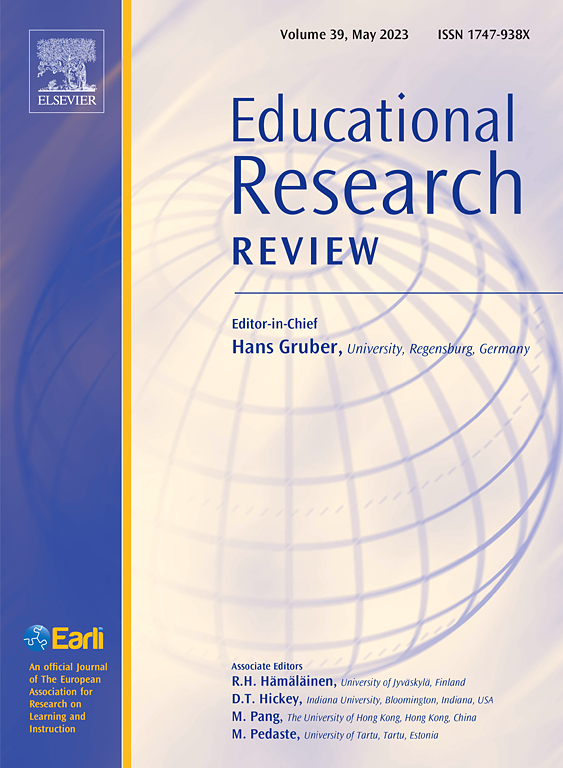有效吗,真的?技术教学与内容知识(TPACK)自我报告评估效度证据的元分析
IF 10.6
1区 教育学
Q1 EDUCATION & EDUCATIONAL RESEARCH
引用次数: 0
摘要
技术教学和内容知识(TPACK)在教师培训和衡量教师对技术增强教学的准备方面发挥着核心作用。因此,制定流行的TPACK自我评估的有效性论证是促进这些领域循证实践的关键。然而,现有的有效性证据大量存在分歧的发现,例如关于在职和在岗教师样本的TPACK自我报告的因素结构。为了综合这些证据并捕捉其异质性,我们进行了一项荟萃分析的系统综述。首先,我们利用元分析结构方程和网络模型分析了TPACK的因素结构,检验了其内部效度。其次,我们比较了两种描述TPACK维度之间关系的理论模型-变革模型和整合模型-与数据的关系。第三,我们通过检查自我报告TPCK与实际技术在教学中的使用的相关性来评估其外部效度。我们的研究结果显示,在职教师样本的TPACK有两个可区分的维度,分别代表技术维度和非技术维度。综合模型总体上更好地拟合了数据。此外,TPACK自我报告与技术使用适度相关(s = 0.23-0.49),并表现出显著的异质性。我们的研究结果强调了在应用TPACK评估对教育研究和实践产生影响时,产生和考虑内部和外部效度证据的重要性。本文章由计算机程序翻译,如有差异,请以英文原文为准。
How valid, really? A meta-analysis of the validity evidence of Technological Pedagogical and Content Knowledge (TPACK) self-report assessments
Technological Pedagogical and Content Knowledge (TPACK) plays a central role for teacher training and measuring teachers’ preparedness for technology-enhanced teaching. Hence, crafting a validity argument of the popular TPACK self-assessments is key to facilitating evidence-based practices in these areas. However, the existing body of validity evidence abounds in divergent findings, for instance on the factor structure of TPACK self-reports across pre- and in-service teacher samples. To synthesize this evidence and capture its heterogeneity, we conducted a systematic review with a meta-analysis. First, we examined the internal validity of TPACK by analyzing its factor structure using meta-analytic structural equation and network modeling. Second, we compared two theoretical models describing the relations among the TPACK dimension—the transformative and integrative models—against the data. Third, we assessed the external validity of self-reported TPCK by examining its correlation with actual technology use in teaching. Our findings revealed two distinguishable dimensions of TPACK for both pre- and in-service teacher samples, which represented the technological and non-technological dimensions. The integrative model provided an overall better fit to the data. Moreover, TPACK self-reports were moderately correlated with technology use ( s = 0.23–0.49) and exhibited substantial heterogeneity. Our results underscore the importance of generating and considering both internal and external validity evidence when applying TPACK assessments to generate implications for educational research and practice.
求助全文
通过发布文献求助,成功后即可免费获取论文全文。
去求助
来源期刊

Educational Research Review
EDUCATION & EDUCATIONAL RESEARCH-
CiteScore
19.40
自引率
0.90%
发文量
53
审稿时长
57 days
期刊介绍:
Educational Research Review is an international journal catering to researchers and diverse agencies keen on reviewing studies and theoretical papers in education at any level. The journal welcomes high-quality articles that address educational research problems through a review approach, encompassing thematic or methodological reviews and meta-analyses. With an inclusive scope, the journal does not limit itself to any specific age range and invites articles across various settings where learning and education take place, such as schools, corporate training, and both formal and informal educational environments.
 求助内容:
求助内容: 应助结果提醒方式:
应助结果提醒方式:


